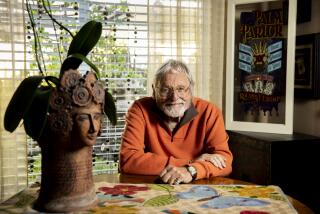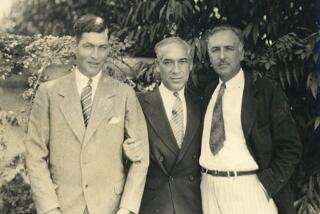Son Calls Wally Berman Piece a ‘Peculiar Fantasy’
- Share via
When I woke up one morning and found a front page Calendar article about my father, the late artist Wallace Berman, and his Semina art and poetry magazine from the ‘50s and ‘60s, I foolishly expected it to be on the facsimile restoration of the publication by art director George Herms.
Instead, I found a peculiar fantasy piece (“Wally Berman, Semina Figure,” June 5) by an overly romantic critic, William Wilson, who must be caught up with the “say no to drugs” movement. Four issues that Wilson brought up must be answered concerning my father’s supposed interest in drugs and the occult. Let’s first deal with the mysterious unknown.
As the article stated, my father was indeed a good friend of the Pasadena artist Cameron, who had/has an interest in occultist Aleister Crowley. My father was aware of Crowley’s writings, but he also read the Los Angeles Times from front to back. Did reading The Times make my father a disciple of Jack Smith or Dear Abby? Wilson’s words, “He was also into the occult,” is like presuming anyone who reads a Stephen King novel is a card-carrying occultist.
Now let me contest Wilson’s obsession with the idea that Wallace Berman = drugs.
According to Wilson, my dad moved to Northern California where the “Bay Area art crowd” was socially motivated by its main interest in hallucinogenic drugs, therefore implying the relationship of my father and his friends was on the basis of drug-taking. This is Wilson at his most romantic and dreamy when he discusses the decadence of people he does not know.
In his defense, I would have to admit that drug-taking was a part of that circle, but for Wilson to write “hallucinogenic drugs seemed to play a key role in these relationships” brings to mind “oversimplifying” in describing a creative and vital group of people. The relationships were bonded by an interest in poetry and art more than drugs in general. Drugs were in that world, but so were cans of soda pop--perhaps the cans of pop also played a key role in the relationships.
The article also reported that “cynics have suspected Berman of supporting his artistic habit by dealing drugs.” That alone is an interesting statement, mixing artistic habit with drugs, which most in society believe is habit-forming, but that is another issue.
However, this is all pretty new to me, considering I spent my first 21 years living with him day and night, and occasionally helping him in his studio, and I never saw him sell or abuse drugs. I wish Wilson would inform his readers who the “cynics” are in his tabloid-style expose of a struggling artist!
The most insulting statement concerning my father is the ending retort about his death caused by a drunken driver. Wilson states that he was “struck down by a driver sodden on substances Berman had held in reverence.” Even if that was true, this is an unethical assault on my father’s memory. But alas, it is not true!
There are drug references in my father’s work, along with references to sex, politics, Cabala, literature, cinema, public figures and so forth. But bringing in the subject of narcotics does not mean one endorses irresponsible individuals who have abused not only their health, but even worse, innocent bystanders.
My father was aware of the drug world--the positive and the negative--and he, like millions of others, had dabbled in drugs (mostly marijuana), but to suggest that his entire existence was based on narcotics is a total exaggeration.
Either Wilson received this information from unreliable sources--he never interviewed my father or any of my family, including my grandmother, who, unlike the article’s description, lived in a comfortable middle-class home--or he just misinterpreted my father’s artwork as glorifying drugs.
I cannot count how many times my father was upset by how the media exploited the world of drugs and made it seem glamorous under the guise of condemnation. He quickly realized that they were the ones making drug-taking an interesting proposal.
Wilson’s harsh statement about my father’s death was cruel and totally unfounded. Tying a tragic incident to falsehoods concerning my father’s lifestyle and art is irresponsible.
More to Read
The biggest entertainment stories
Get our big stories about Hollywood, film, television, music, arts, culture and more right in your inbox as soon as they publish.
You may occasionally receive promotional content from the Los Angeles Times.










